News

Storm Dennis: Flood threat remains after weekend of disruption
Storm Dennis: Flood threat remains after weekend of disruption
Referred from BBC News on 17/02/2020
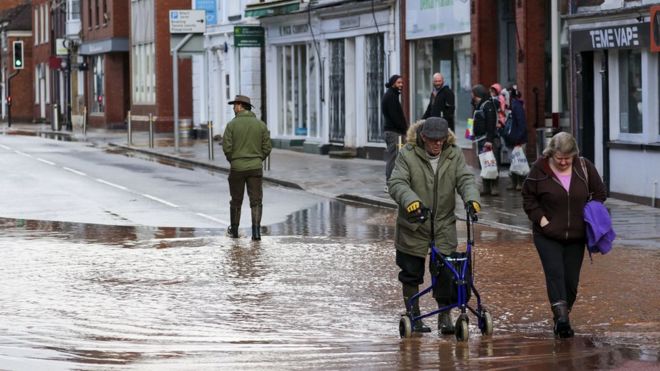 STEVE PARSONS/PA
STEVE PARSONS/PA
Towns near the River Severn are now the government's "greatest concern" as more severe flood warnings are triggered in the aftermath of Storm Dennis.
More than 200 flood warnings are in place across the UK, including six severe - or "danger to life" - warnings for the rivers Lugg, Severn and Wye.
In Hereford, the River Wye has risen to its highest level on record while a woman is missing and believed dead in floodwater in Worcestershire.
The government defended its response.
Environment Secretary George Eustice said the government could not protect every home.
Natural Resources Wales said the scale of the flooding was "unprecedented".
The south Wales valleys saw the highest water levels for more than 40 years over the weekend, according to Jeremy Parr, head of flood and risk management at Natural Resources Wales.
- LIVE: Floods and travel chaos persist after storms
- Storm Dennis: In pictures
- Woman missing in floods believed to be dead
Travel continues to be disrupted across the UK, with some A-roads closed and train lines disrupted.
The Environment Agency said more than 400 properties had been flooded after Storm Dennis brought torrential rain and strong winds to the UK.
John Curtin, the Environment Agency's head of floods and coastal management, said on Twitter that number was "likely to rise" - but indicated figures were lower than those for Storm Ciara earlier this month.
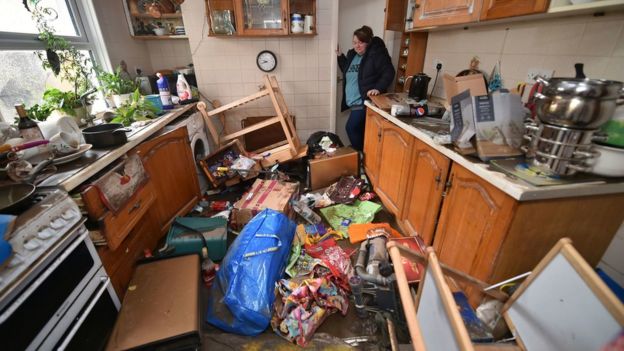 BEN BIRCHALL/PA WIRE
BEN BIRCHALL/PA WIRE
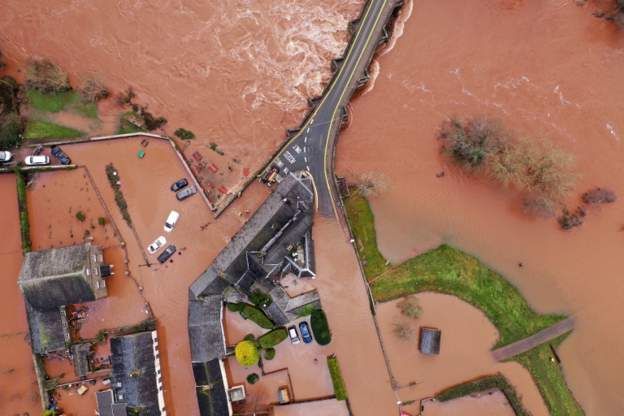 GETTY IMAGES
GETTY IMAGES
Several schools have been closed and roads remain blocked by floods and landslips.
Jeanette Cox said the only surviving object on the bottom floor of her home the village of Nantgarw, near Cardiff, was a wedding photograph of her and her late husband.
Mrs Cox, 68, said it was "terrifying" to discover water at the bottom of the stairs in the early hours of Sunday morning.
She and her daughter Rachel were evacuated but returned home on Monday morning to assess the scale of the damage.
"The water has moved things I didn't think could move. I think there are just two cupboards standing - the rest is gone," Mrs Cox said.
Search suspended
In Worcestershire, police searching for a woman who was swept away in floodwater near Tenbury Wells said it has become "a recovery rather than a rescue operation".
The search was suspended overnight as fast-flowing water made conditions "extremely challenging", chief superintendent Tom Harding of the West Mercia Police said.
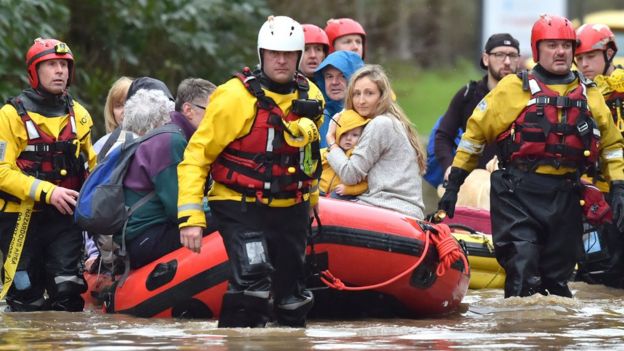 PA MEDIA
PA MEDIA
A relief centre for displaced residents has been set up at the high school in the town, where around 130 properties were evacuated on Sunday.
Response teams worked into the early hours of Monday morning to rescue stranded residents from their homes by boat.
The county council has warned that more evacuations could be necessary.
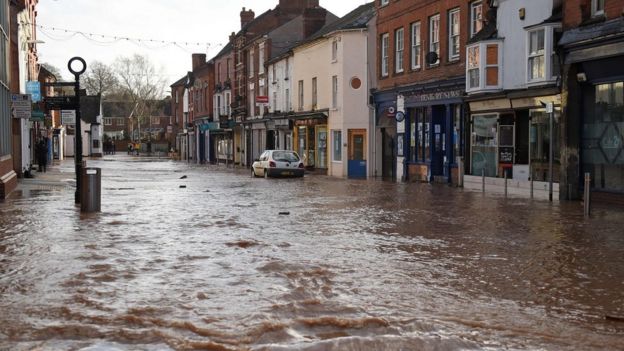 AFP/GETTY IMAGES
AFP/GETTY IMAGES
In Staffordshire, serious flooding cause a youth climate strike conference to be called off.
The first ever national conference was due to start on Sunday afternoon, with delegates travelling from across the UK.
But police advised the event should be cancelled after heavy rain made roads around the venue impassable, the UK Student Climate Network said.
Sophia Coningham, 15, from London, said there was a "bleak irony" in being beaten back by climate change.
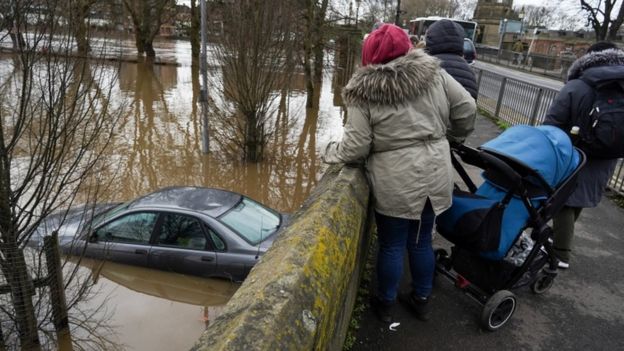 IAN FORSYTH/GETTY IMAGES
IAN FORSYTH/GETTY IMAGES
In York, the River Ouse reached 4.41m above its normal level by 11:00 GMT on Monday. The record high was 5.4m in November 2000.
Thousands of sandbags have been placed around vulnerable properties nearby, but the Environment Agency has said the situation in the city is "improving".
Mr Eustice told BBC Breakfast that towns near the Severn - including Shrewsbury, Tewkesbury and Bewdley - are the government's "greatest concern", as water levels are expected to rise further.
He said the government "can't protect every home" but is stepping up spending.
Around £2.5bn has been spent on tackling extreme weather conditions since 2015 and £4bn has been allocated for the next five years, Mr Eustice said.
He said convening Cobra, the government's emergency committee, was not needed "at this point". A Cobra meeting was held when parts of the UK saw flooding in the run-up to the 2019 general election.
Downing Street said Prime Minister Boris Johnson will receive "regular updates" on the flooding, which it described as "terrible".
It added that the government has deployed three miles (5km) of flood barriers, 1,000 Environment Agency staff and the military.
The government has activated an emergency funding scheme for areas affected by the flooding, which include parts of Nottinghamshire, Leicestershire, Derbyshire, Shropshire, Telford and Wrekin, Worcestershire and Herefordshire.
Under the Bellwin scheme, local authorities can apply for the government to reimburse non-insurable costs above a certain threshold, which has not been specified.
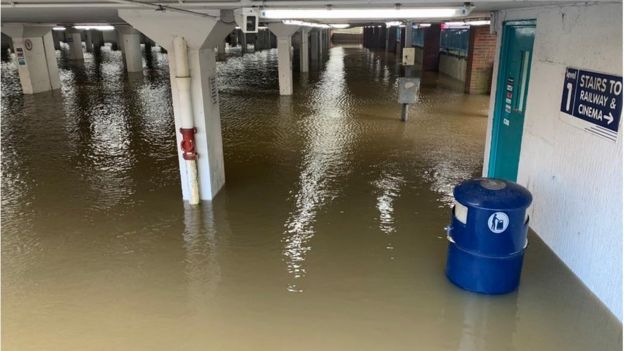
A record number of flood warnings and alerts were issued for England on Sunday, according to the Environment Agency's head of floods and coastal management.
There are also 30 flood warnings and alerts in Wales and more than 20 in Scotland.
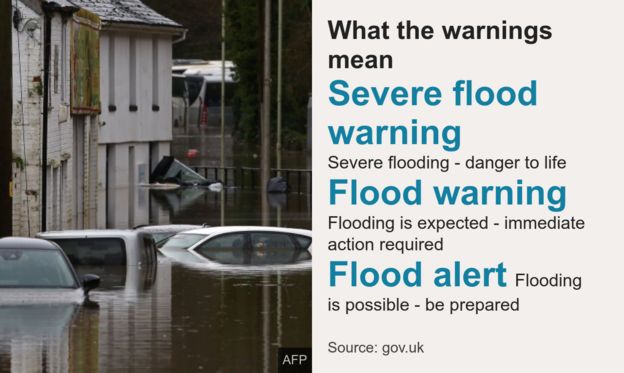
On Sunday, major incidents were declared in south Wales and parts of England, as parts of the UK were buffeted by wind gusts of more than 90mph.
More than a month's worth of rain fell in 48 hours in places.
Dramatic video footage emerged of a landslide tearing down a mountain in Tylorstown, Rhondda Cynon Taf, south Wales, on Sunday morning.
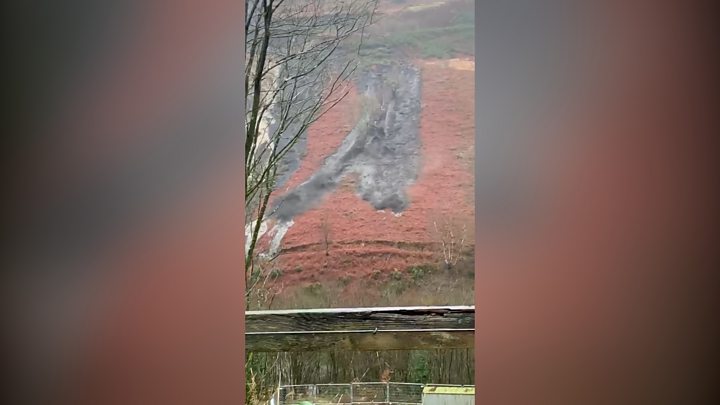
Emergency centres were set up for those who were displaced.
Also on Sunday, Storm Dennis caused flights and train services to be cancelled and roads to be closed, and a man was rescued from the Teme in Worcestershire and taken to hospital by ambulance, police said.

